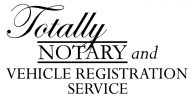Notarizing for the elderly can present a unique set of challenges.
- Their identification can be expired.
-If so, two impartial credible witnesses may be required - They can be physically weak from illness or injury which makes signing a document difficult
-If so, they may need to “Sign by Mark”, which also requires two impartial witnesses to watch and sign their names as witness. - They may be taking medication that causes impairment
-In this case, the notarization must be postponed until the signer is aware of what they are signing - They may be a patient in a Skilled Nursing Facility (SNF)
-If the document is an Advanced Health Care Directive (AHCD), an ombudsman will be required to witness the signing of the document and the ombudsman may require an appointment. - They may be incapacitated or unwilling to sign
-The signer must be willing and aware or the notarization cannot proceed.
In many cases, a family member calls to schedule the appointment for mobile services. Their elderly relative may still be at home, but more often, they are either a resident in an assisted living senior facility or a patient receiving short or long-term care in a medical facility. They may be in a local hospital or residing in a long-term convalescent facility, or they may be receiving treatment in a skilled nursing facility (SNF). A skilled nursing facility is a medical facility that is licensed, regulated and inspected by the Department of Health Services and provides 24hr medical care.
Most of the time, I am called to notarize Power of Attorney documents or some type of proof of life document so the senior citizen may continue to received their pension or insurance benefits. If the document is an Advanced Health Care Directive (AHCD), however, and the signer is a patient in a skilled nursing facility, there are special witness requirements.
In California, a patient advocate, called an ombudsman, needs to be present and serves as an official witness to the signing of the document. If the Advanced Health Care Directive is signed without an ombudsman witnessing and certifying the execution, the document is not effective and will be invalid until resigned in front of an ombudsman.
Per Probate Code Section 4675:
(a) If an individual is a patient in a skilled nursing facility when a written advance health care directive is executed, the advance directive is not effective unless a patient advocate or ombudsman, as may be designated by the Department of Aging for this purpose pursuant to any other applicable provision of law, signs the advance directive as a witness, either as one of two witnesses or in addition to notarization. The patient advocate or ombudsman shall declare that he or she is serving as a witness as required by this subdivision. It is the intent of this subdivision to recognize that some patients in skilled nursing facilities are insulated from a voluntary decisionmaking role, by virtue of the custodial nature of their care, so as to require special assurance that they are capable of willfully and voluntarily executing an advance directive.
(b) A witness who is a patient advocate or ombudsman may rely on the representations of the administrators or staff of the skilled nursing facility, or of family members, as convincing evidence of the identity of the patient if the patient advocate or ombudsman believes that the representations provide a reasonable basis for determining the identity of the patient.
As a California notary public, I must follow a code of professional responsibility. Not only am I responsible for establishing the signer’s identity, I am also required to determine their awareness of what they are signing and their willingness to do so.
Notarizing for elderly clients can be challenging, but with advanced screening and a little preparation, most notarizations can be completed successfully.
©2015 Totally Notary All Rights Reserved


Leave A Comment